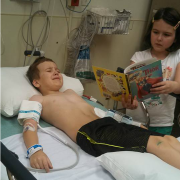Broken Bones, a Stranger in a Wheelchair, and the Power of Scars
The kids and I wanted to do something really memorable for the last day of school a couple of weeks ago. Mission accomplished: my 6-year-old son broke his arm when he jumped out of a swing and landed wrong. Poor little guy! I think his fear was as difficult to bear as the pain. He kept saying, "I don't want to be broken!" It took some time to assure him (and his big sister) that in time, he would heal.
For the next several days, my shy little boy bristled every time we went to the grocery store, pharmacy, etc., because strangers would notice his sling and come talk to him about it. "How did you do that?" everyone wanted to know. "But was it fun doing it?" "What a way to start the summer!" "At least it wasn't your leg!" My son learned to make small talk about his broken bones (both bones in the left forearm snapped), but I could tell he didn't care for the attention.
And then we went to the orthopedic surgeon's office to get his cast put on. As we stood waiting at the receptionist desk, a man was rolled out into the lobby in a wheelchair. He was a large man, with bushy white hair and beard, not unlike our typical image of Santa Claus, except for this gentleman sported shorts, a T-shirt, and an eight-inch scar traversing his right knee. I thought my son would be afraid of this stranger. After all, he was big, even in a wheelchair, and he had facial hair, which for some reason still makes my son uncomfortable.
But what happened next brought tears to my eyes. The stranger in the wheelchair locked eyes with my son--after all, they were on the same level. The man then said simply, "Are you OK?"
My son glanced at the scar on the man's knee, the wheelchair, and up to the man's eyes again. He nodded. "I'm OK."
What touched me about this was that the man didn't ask what happened. It wasn't curiosity that prompted him to speak. He had noticed that a little boy had been injured, and simply asked if he was all right. He could have pointed to his own pain, to his immobility, in a "Be grateful, I have it worse than you," sort of way. But he didn't mention it. He didn't need to.
And in that moment, I saw a connection take place between my shy little guy and a burly stranger my son would normally be afraid of. They saw each other's pain, and acknowledged it. No fanfare. No jokes. Just simple, quiet, beautiful validation. Friends, scars have power. No one wants to be wounded, either physically or emotionally. But very often, when we are, we are marked by it. God can use those scars for good:
1. Being wounded opens our eyes to the suffering of others.
2. Scars give us credibility when we speak of both pain and of healing.
3. Scars bear silent testimony that we have lived through something excruciating. We made it through to the other side. For those currently suffering, the reminder that better days will come is a wonderful gift, indeed. It is hope.
Col. Brian Birdwell (U.S. Army, retired) survived being in the Pentagon when a plane crashed into it on 9-11-01. He was burned over 60 percent of his body, and his mere survival is a miracle. But he still bears scars. When he talks to other burn victims now, he doesn't start off by telling his own story. He doesn't need to. His scars make it clear that he understands.
Of course, some scars are invisible. Laurie Wallin has four daughters, two of whom have special needs. When she sees another mom in a doctor or therapist's waiting room with tears in her eyes and a faraway look on her face, Laurie doesn't tell that tearful mom to buy Laurie's new book, Get Your Joy Back (which, BTW, is an amazing book). She offers her a kleenex, and puts her arm around her shoulders. True compassion need not say much.
When Jesus appeared to His disciples after His resurrection (see Luke 24:38-39), the scars in His hands and feet proved three things:
1) He was who He said He was;
2) He had conquered death, just as He said He would; and
3) He can relate to any degree of human suffering.
What a comfort! A very wise man I worked with once told me, "If we Christians never experienced pain, we would be tragically irrelevant to the rest of the world." Our scars are our proof that we can relate to others in pain--and that there is hope. [[{"type":"media", "view_mode":"media_large", "fid":"1276", "attributes":{"class":"media-image aligncenter size-medium wp-image-3218", "typeof":"foaf:Image", "style":"", "width":"300", "height":"300", "alt":"scarshavepower"}}]] And we are not without comfort. Neither are we without the ability to comfort others.
"Praise be to the God and Father of our Lord Jesus Christ, the Father of compassion and the God of all comfort, who comforts us in all our troubles, so that we can comfort those in any trouble with the comfort we ourselves receive from God." ~1 Corinthians 1:3-4
In five weeks, my son's cast will come off and he'll be able to ride his bike, play baseball, and swim again. He's really looking forward to being "back to normal." But I'm hoping and praying that his "normal" from now on will include a generous portion of compassion for those who hurt.
What about you? Have you had a life experience that has brought you more compassion for others? Or have you received compassion from someone that was especially meaningful to you?

